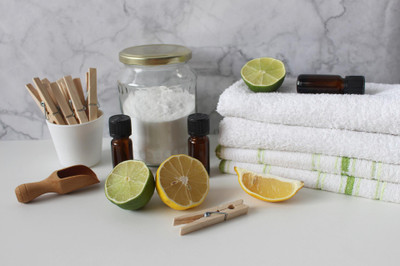Essential Oils: What You Need to Know
May 25th 2022 by Viva Doria Admin

Have you ever heard of essential oils? Do you want to learn more? Then this is the perfect article for you. Our essential oil guide will provide you with everything you need to know about them, including how they work, why they're good for you, and what essential oils are best for beginners.
What are essential oils?
Essential oils are concentrated aromatic liquids that contain the actual molecules of plants. There are a few things to know and look for when buying essential oils. First, not all plant-based aromatics are created equal. You're looking for essential oil brands containing only plant material, with no additives or carrier oils. This is important because the quality of your essential oil will directly affect the quality of its aroma.
- Essential oils are not vegetable oils like canola or olive oil; these contain fatty acids and proteins and will make your room smell like a salad dressing factory. Essential oils are not fragrance oils; they contain synthetic materials that could have harmful effects on your health and fake-smelling aromas (no one wants their home to smell like a chemical experiment).
How are they made?
Essential oils are made through a distillation process that extracts the natural oil from flowers, bark, stems, leaves, roots, or other plant parts. The plant's "essence" is extracted through steam distillation or cold pressing (for citrus peels). In some cases, they may also be extracted through solvent extraction using alcohol.
Here are some other methods of essential oil extraction:
Solvent extraction: This involves making a solvent of alcohol and water used to dissolve the essential oil from plants.
Expression: This method uses pressure to extract the essential oils from plant material. It's similar to squeezing lemon juice or orange juice.
Cold pressing (also known as an expression or mechanical pressing): This method uses pressure combined with heat to extract the essential oils from plant material.
Enfleurage: This method uses fat (such as vegetable oil) to absorb the fragrance of flowers, leaves, stems, and bark to be preserved for later use in perfumes and potpourris.
What are the essential oil benefits?
Essential oil is a liquid that contains the essence of a plant. It can be used in aromatherapy to help improve your mood or ease stress, or it can be added to your bath or put on your skin. Some people use essential oils as part of their skincare routine. Some essential oil uses are:
- Relaxation and mood improvement: When you breathe in the scent of essential oil, it sends chemical messages through receptors in the nose to the part of the brain that affects emotions (the limbic system). You may feel more relaxed or calm. You might also feel less anxious, stressed, or depressed.
- Pain relief: Aromatherapy massage with certain essential oils may reduce chronic pain symptoms and improve sleep quality, according to a study published in The Journal of Alternative and Complementary Medicine in 2015. Study participants received weekly aromatherapy massages for five weeks using either lavender oil or almond oil and reported less pain after treatment.
- Sleep problems: Aromatherapy massage with lavender oil has been shown to significantly improve sleep quality among people who have trouble falling asleep (insomnia), according to three research studies published between 2007 and 2012. In one study, lavender aromatherapy massage reduced depression and insomnia among patients undergoing cancer treatments at a hospital clinic.
Read Also: Health Benefits of Food Grade Essential Oils
What should you look for when buying an essential oil?
Where to buy essential oils? Buy essential oil bottles from a trusted source. E.g. Vivadoria website (most trusted website for many years)
- When shopping for essential oil, make sure that the botanical name is on the label. This will ensure that you're getting what you think you're getting.
- When buying an essential oil product, look for 100% pure essential oil, and be careful about diluents and carrier oils, which are not always indicated on labels.
- Buy small quantities since most of these products go bad over time regardless of whether they have been stored properly, so investing in large amounts might be wasted money depending on how quickly one uses them up!
Read also: How to Find the Wholesale Essential Oil Suppliers & Distributor?
Can you make your essential oils?
Essential oils are not easy to make, but it's possible if you're willing to put in the time and effort. The first step is purchasing a still, which will set you back about $1,000 or more. You have to source the right ingredients—common herbs or flowers are best—and follow the correct steps for distilling them down into the oil. Your product may initially come out wrong and require multiple rounds of testing and refining before it becomes usable.
It's not impossible to create your organic essential oils from scratch, but it is quite labor-intensive and expensive. If you're interested in trying this process out for yourself after understanding all that goes into making essential oils be prepared for a long journey!
Related Blogs:
Read Also: 7 Must-Try Essential Oils to Fight Anxiety & Stress
Read More: Peppermint Essential Oil: 10 Ways to Improve Your Health
Read More: Jasmine Essential Oil: What you Need to know
Read More: Clove Essential Oil - Compositions, Benefits & Uses
Read More: Lavender Essential Oil: The Surprising Health Benefits and Uses
Read More: Everything You Need to Know About Cedarwood Essential Oil
Read More: Health Benefits of Food Grade Essential Oils
Read More: Sandalwood Essential Oil to Help You Have the Best of All
Read More: Turmeric Essential Oil: The Natural Way to Boost Your Health
Read More: Lemongrass Essential Oil – Everything You Need to Know
Read More: Helichrysum Essential Oil: The Herb of Immortality
< View all posts